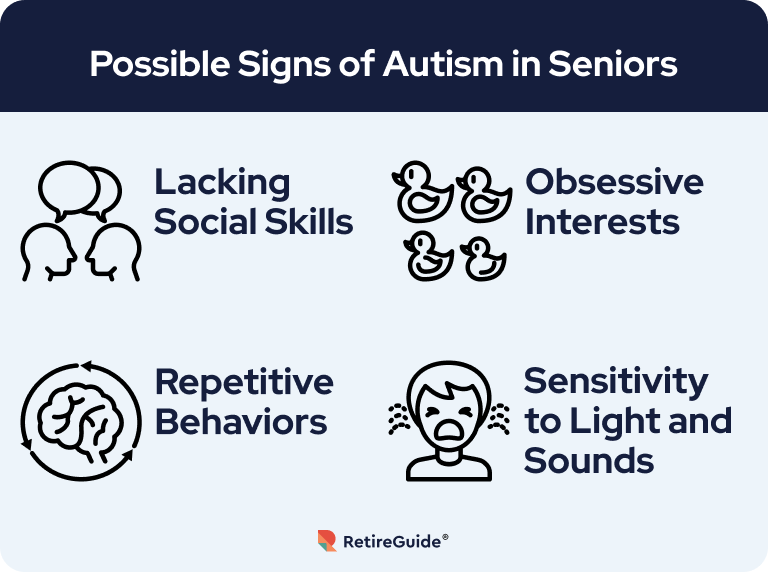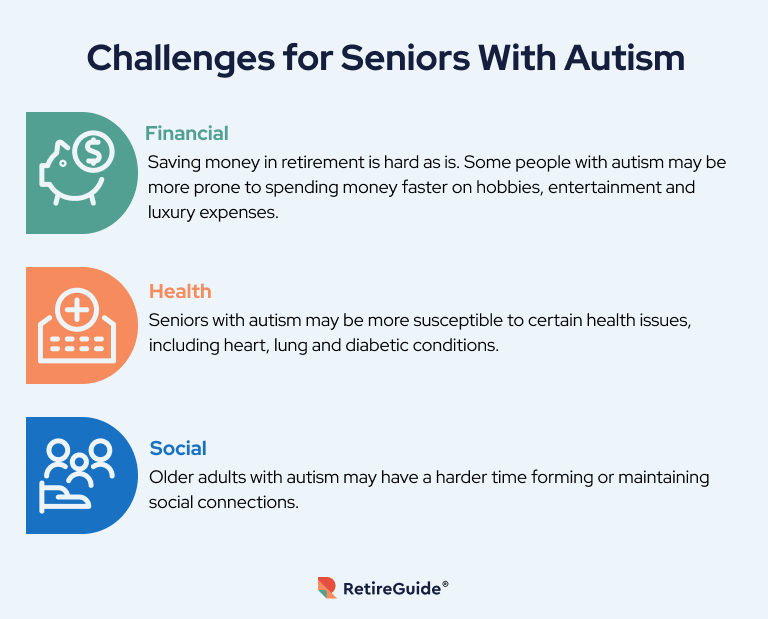Seniors on the Autism Spectrum
Seniors across the country deal with numerous physical and mental health conditions every day that have been heavily studied, but there is not nearly as much research on the experience of those who are on the spectrum. Better understanding what autism looks like in seniors and how it may impact their lives can help make a difference for both them and their families.

- Written by Christian Simmons
Christian Simmons
Financial Writer
Christian Simmons is a writer for RetireGuide and a member of the Association for Financial Counseling & Planning Education (AFCPE®). He covers Medicare and important retirement topics. Christian is a former winner of a Florida Society of News Editors journalism contest and has written professionally since 2016.
Read More- Edited By
Lamia Chowdhury
Lamia Chowdhury
Financial Editor
Lamia Chowdhury is a financial content editor for RetireGuide and has over three years of marketing experience in the finance industry. She has written copy for both digital and print pieces ranging from blogs, radio scripts and search ads to billboards, brochures, mailers and more.
Read More- Reviewed By Bart Astor
- Published: February 21, 2023
- Updated: May 23, 2023
- 9 min read time
- This page features 12 Cited Research Articles
- Edited By
- There is little research available on seniors and older adults with autism, which can make understanding what they go through more difficult.
- Seniors with autism may be more susceptible to challenges that many older adults face, including financial challenges and the risk of developing health conditions.
- People with autism sometimes have a more difficult time in social settings and building relationships, which becomes critical later in life when social ties grow in importance.

Symptoms To Watch for in Older Adults with Autism
According to the U.S. Centers for Disease Control and Prevention, more than 5.4 million American adults have autism.
But even though it affects more than 2% of all Americans, there is simply not a lot of research on what autism looks like in seniors. While autism is often diagnosed in young children, many older adults grew up in a time when the condition was less understood and less often identified.
This can help contribute to seniors who have autism but are undiagnosed. Common signs and symptoms associated with autism can also evolve through different phases of life and become less noticeable, making late-in-life diagnoses even more difficult.
Another issue is the fact that autism is a remarkably diverse condition that can encompass individuals whose symptoms may look very different.
“Autism is a very wide spectrum. There are some individuals with autism who also have an intellectual disability and they may be nonverbal. They may have some challenging behaviors that require significant care from someone else,” Nicole Matthews, the Director of Research at the Southwest Autism Research & Resource Center, told RetireGuide.
“And on the other end of that spectrum are individuals with autism who do not have an intellectual disability. They may be living completely independently. They might not have any challenges at all.”
While symptoms vary heavily from case to case, some potential signs to watch for in seniors may include routine or repetitive behavior, as well as intense and obsessive interests.
Older adults with autism may also have less honed social skills and struggle more with social interactions. Some people may also have extra sensitivity to things like loud noises or bright lights.
Identifying autism in older adults can also be made more difficult considering the signs may look different in both men and women.

According to an article from Parade, women in particular may go undiagnosed later into life, in part due to the fact that signs and symptoms may be more muted for them.
Does Autism Get Worse With Age?
It’s important to remember that autism is not an illness and does not act as such. For this reason, autism does not necessarily worsen over time.
But the outfacing signs of what it looks like can change as people age and go through different stages of life.
Autism may be more readily identifiable in children opposed to adults, since adults often learn to hide some of the signs due to societal pressure.
According to NPR, it can be common for adults with autism to mask themselves, meaning they fake or replicate common social behaviors to better blend in and avoid the judgment and questions that come with standing out.
“A lot of our adults talk about masking,” Matthews said. “Some share that if they, for example, are seeking a diagnosis, that they are concerned that their autism won’t be detected because they are masking.”
Challenges Faced by Older Adults on the Spectrum
While older adults on the spectrum can face additional challenges, it is important to remember that autism is not always a debilitating condition. Some adults with autism can have strong and independent lives, which is part of the reason that diagnosing seniors isn’t always easy.
But all cases are not the same, and there are some problems faced by older adults that can be exacerbated for those who are on the spectrum.

Financial Challenges
Financial challenges can be a significant burden for many seniors. Retiring is expensive, and older Americans who were unable to save properly often struggle to maintain a solid standard of living in retirement.
There are some circumstances where this can be particularly challenging for those with autism. According to an article from the Adult Autism Center, people with autism are sometimes quicker to spend money on things that they want or enjoy, like hobbies and luxury expenses.
This tendency could potentially exacerbate financial issues for seniors who are already struggling to make ends meet while also leaving less money for other more important expenses, such as housing, which can be a major issue for autistic adults.
Older adults often also must deal with additional expenses that come with specialized care.
Health Challenges
Health challenges are naturally an issue for many seniors. The older you get, the more potential health pitfalls emerge.
But according to the University of Cambridge, health challenges may be particularly likely for those on the spectrum.
People with autism may be more at risk for developing physical health conditions. Heart, lung and diabetic conditions in particular are common.
- Diabetic Conditions
- Heart Conditions
- Lung Conditions
According to Matthews, some research has shown that adults with autism may also experience worse cognitive decline.
These conditions make health challenges a particularly important area for seniors with autism to stay on top of.
Social Challenges
Social challenges can be a massive hurdle for many seniors and retirees. Human beings are wired for connection, and maintaining those connections can be more difficult than ever in retirement.
Simple social ties like speaking with coworkers or parents of your children’s friends are not likely to happen in retirement. Without those connections, it can be easy to become socially isolated and develop issues like anxiety or depression.
This is a serious issue that can be heavily exacerbated for seniors with autism since those on the spectrum often already have a more difficult time building and maintaining relationships and social ties.
“We continue to see challenges with social communication in most adults as they age,” Matthews said.
While it can be difficult to maintain relationships for those with autism throughout life, it becomes especially critical as social ties begin to dwindle later in life.
Limited Research on Seniors
A massive barrier for seniors with autism is that there is not a lot of research devoted to this area. Autism awareness is growing steadily, but much of the existing literature has centered on autism in children.
“We don’t know a lot about aging in autism. Research on this age group is not as great as it is on children,” Matthews said. “It’s just a teeny, tiny slice of the research that has been conducted on autism over the years.”
This lack of research means that even simple data such as how many seniors live with autism is not readily available. Autism.org found that research varies so heavily that the number could range anywhere from about 30,000 to over 900,000.
Simply put, there is not a lot of data available, and that can make it difficult to understand and provide solutions for some of the common issues that seniors with autism may face.
Struggles With Diagnosing Autism
Diagnosing autism is not always an easy or straightforward feat, especially when an individual is not diagnosed early in childhood.
The signs of autism can also vary heavily from person-to-person and can sometimes be very mild or not readily apparent. In fact, the criteria used for diagnosing can make it particularly difficult for seniors.
“It’s really challenging to find a practitioner that feels comfortable diagnosing autism past the young adult period,” Matthews said. “A lot of that is because the diagnostic criteria requires that there be evidence of differences in the early childhood period.”
An added struggle with diagnosing autism particularly in seniors is the fact that they may not want to seek out a diagnosis, even at the urging of family. Women also tend to be heavily undiagnosed since autism may look different for them than it does for men.
Another added factor in the struggle to diagnose autism is the fact that research is still evolving. It may be easier to diagnose older adults with autism in the future when more research has been conducted on the community.
Complicated Feelings Towards a Parent With Autism
An added issue for seniors with autism is the fact that children may have complicated feelings towards parents on the spectrum in some circumstances.
Autism can make it more difficult for people to form social connections, understand social cues and interact with others. This naturally can make parenting more difficult in some situations, especially if the child does not understand that autism is the cause of some of these tendencies.
According to the Clay Center for Young Healthy Minds, people with autism can be heavily routine-oriented, and having a child dramatically disrupts that routine.
Having and raising a child includes the formation of many new relationships, from other parents to doctors to teachers, that can all be a little more difficult to achieve or maintain for some people with autism.
Resources for Older Adults with Autism and Their Caregivers
While there isn’t a significant amount of research available on what it is like for seniors to live with autism, there are resources available that can be useful in numerous situations.
It’s critical to create a plan of care for a senior with autism once the primary caregivers can no longer provide that care. According to Matthews, special needs attorneys, social workers and similar organizations can help make some of these plans.
One useful resource hub is the Autism Society, which offers plenty of relevant information for those with autism and caregivers, as well as housing, employment and health resources.
The Organization for Autism Research (OAR) is another strong resource, offering access to extensive research, as well as helpful guidebooks, studies and other key information. OAR offers educational and academic resources as well.
One common and easy way for seniors to stay involved in communities, build social connections and foster relationships is to find part-time jobs. HireAutism.org can help those with autism find jobs that make sense for them.
Expert Contributor
-
Nicole MatthewsDirector of Research at the Southwest Autism Research & Resource Center.

12 Cited Research Articles
- Deering, S. (2022, August 31). Here Are 10 Signs of Autism in Adults, According to Experts. Retrieved from https://parade.com/health/signs-of-autism-in-adults
- Garcia, E. (2022, April 18). How “Unmasking” Leads to Freedom for Autistic and Other Neurodivergent People. Retrieved from https://www.npr.org/2022/04/14/1092869514/unmasking-autism-more-inclusive-world
- Organization for Autism Research. (2021). A Guide for Transition to Adulthood. Retrieved from https://researchautism.org/resources/a-guide-for-transition-to-adulthood/
- Bush, H. (2020, March 4). AsperDad: Growing Up With a Parent on the Autism Spectrum (Maybe). Retrieved from https://www.mghclaycenter.org/parenting-concerns/families/asperdad-growing-up-with-a-parent-on-the-autism-spectrum-maybe/
- University of Cambridge. (2020, September 9). Autistic Adults Have a Higher Rate of Physical Health Conditions. Retrieved from https://www.cam.ac.uk/research/news/autistic-adults-have-a-higher-rate-of-physical-health-conditions
- Moreno, S. (2018). Autism After 65: Making the Most of the Golden Years. Retrieved from https://www.iidc.indiana.edu/irca/articles/autism-after-65.html
- Davies, C. (2015). Increasing Independence in Adults with Autism Spectrum Disorders: Using a “To Do” List. Retrieved from https://www.iidc.indiana.edu/irca/articles/increasing-independence-in-adults-with-autism-spectrum-disorders-using-a-to-do-list.html
- Volkmar, F. and Wolf, J. (2013, March 7). When Children with Autism Become Adults. Retrieved from https://www.ncbi.nlm.nih.gov/pmc/articles/PMC3619174/
- Geurts, H. and Vissers, M. (2011, June 8). Elderly with Autism: Executive Functions and Memory. Retrieved from https://www.ncbi.nlm.nih.gov/pmc/articles/PMC3324697/
- Adult Autism Center. (n.d.). Financial Resources for Adults with Autism. Retrieved from https://adultautismcenter.org/blog/financial-resources-for-adults-with-autism/
- Autism Research Institute. (n.d.). Autism Symptoms and Diagnosis in Adults. Retrieved from https://www.autism.org/autism-symptoms-and-diagnosis-in-adults/
- Edelson, S. (n.d.). Aging in Autism: A Call to Action. Retrieved from https://www.autism.org/aging-autism-call-to-action/
Calling this number connects you to one of our trusted partners.
If you're interested in help navigating your options, a representative will provide you with a free, no-obligation consultation.
Our partners are committed to excellent customer service. They can match you with a qualified professional for your unique objectives.
We/Our Partners do not offer every plan available in your area. Any information provided is limited to those plans offered in your area. Please contact Medicare.gov or 1-800-MEDICARE to get information on all of your options.
866-749-5443Your web browser is no longer supported by Microsoft. Update your browser for more security, speed and compatibility.
If you need help pricing and building your medicare plan, call us at 844-572-0696


